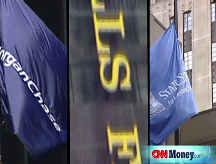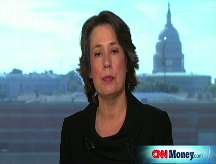Big loss for Merrill
No. 1 U.S. brokerage reports worse-than-expected quarterly loss of $5.58 per share, says it will issue $10B in equity to Treasury.
NEW YORK (CNNMoney.com) -- Another quarter, another massive loss for Merrill Lynch.
Merrill (MER, Fortune 500), which is about to fold into Bank of America (BAC, Fortune 500), turned in its 5th-straight quarterly loss Thursday. The nation's largest brokerage firm reported a net loss of $5.2 billion, or $5.58 per share, compared with $2.2 billion, or $2.82 per share, a year ago.
Analysts polled by Thomson Reuters were expecting a loss of $5.22 a share.
The company took $9.5 billion in writedowns as the value of its residential mortgage-backed securities continued to decline. This is on top of roughly $39 billion in writedowns over the past year.
Revenue came in at $16 million, compared with $380 million a year earlier. Analysts were expecting $760 million.
Merrill shares were down 1.5% in mid-day trading, after rising 3.3% in the wake of the quarterly report.
Merrill said it will issue $10 billion of preferred stock and warrants to the U.S. Treasury as part of the federal government's recapitalization of the banking sector.
The company shed 3,300 jobs over the past year. It now has 60,900 full-time employees.
However, during the quarter, it did add 160 financial advisers to its global wealth management division. Merrill executives cited this segment as one of its stronger ones, though the unit's revenue dropped 9% year-over-year and its profit margin fell to 23.9% from 26.9%. Clients pulled out $3 billion, mainly when the stock market declined in September.
Merrill's investment banking division's performance remained weak in an overall tepid market.
The company also recorded a pre-tax gain of $4.3 billion from the previously announced sale of its 20% stake in Bloomberg L.P.
Merrill's suffering, which began with the mortgage meltdown a year ago, is now compounded by the weakening economy. Like its Wall Street peers, Merrill has been hard hit by the global financial crisis. The company has lost $24.4 billion since the mortgage crisis started five quarters ago.
During a tense week in mid-September, Merrill agreed to be purchased by Bank of America to escape the fate which befell rival Lehman Brothers, which declared bankruptcy.
Together, the banks will make up one of the largest financial services companies in the nation, with more than 30% of the deposits in the United States and leading positions in commercial banking, investment banking and asset management.
In preparation for the sale, Merrill has been slashing its holdings of toxic mortgage assets. The company has reduced its exposure to domestic Alt-A residential mortgages by 98%, its non-U.S. residential mortgages by 56% and its commercial real estate by 25%. It has only $295 million in exposure to subprime mortgages, down 71%.
Merrill's exposure is now mainly to prime mortgages, with borrowers who have solid credit scores of more than 750, loan-to-value ratios of less than 60% and no history of losses.
"Overall [we're] just continuing to bring down risky assets and continuing to bring down illiquid assets," said Chief Executive John Thain.
Analysts were not surprised that the company took a big loss, especially as it streamlines its operations in advance of the merger.
"Make sure you write off everything," said Bruce Foerster, president of South Beach Capital Markets, a corporate financial and governance advisory firm. "Get it done."
Its rescuer, however, is also faltering, reporting worse-than-expected earnings last week. In a surprise announcement, Bank of America said its third-quarter net income fell to $1.18 billion, or 15 cents per share, down 68% from a year earlier. It also said it would slash its dividend in half and raise $10 billion through a stock sale to strengthen its capital position.
Going forward, Bank of America will have a $25 billion capital injection, including Merrill Lynch's $10 billion share, from the federal government to bolster its operations. The bank is still digesting its acquisition of troubled mortgage lender Countrywide on July 1. It is hoping to close the Merrill deal by year-end.
Thain will lead the combined company's global corporate investment banking and global wealth and investment management divisions, which will incorporate most of Merrill's businesses.
Despite these dismal earnings, the company's wealth management division remains sound, considering the stock market gyrations, experts said. This team of 16,850 financial advisers was a key reason behind the deal.
"The underlying franchise is still there," said Benjamin Wallace, securities analyst at Grimes & Co. "That's what Bank of America is after."
The government's program to assist banks should resolve the problems in the credit markets, which froze after Lehman's bankruptcy, Thain said. It should provide the liquidity and financing banks need to unlock this crucial sector, which many businesses depend on to fund their daily operations.
After a month of turmoil that changed the face of the U.S. financial system, the Bush administration Tuesday said it would inject $250 billion into the nation's faltering banks. Half will go to nine major financial institutions, including Citigroup, JPMorgan Chase, Wells Fargo and Morgan Stanley.
For the time being, Merrill will use its $10 billion as a cushion until the merger is completed.
The economy, however, is the bigger problem, Thain said. Already, there are signs of a significant contraction around the world.
"The real question will be how deep and how long," he said.
Rising unemployment will hurt the financial companies in the fourth quarter and beyond, said Jon Fisher, portfolio manager at Fifth Third Asset Management. Even some seemingly solid customers with good credit scores are pulling back on spending and struggling to pay the bills.
"It will be the same thing," Fisher said, referring to the fourth quarter. "Business isn't getting any better."
So far this week, three major banks reported better-than-expected earnings.
Citigroup (C, Fortune 500) reported a loss of $2.8 billion, or 60 cents per share, Thursday. Analysts had been expecting a loss of 70 cents per share.
Wells Fargo (WFC, Fortune 500) said Wednesday that it earned $1.64 billion, or 49 cents a share, down 25% from a profit of $2.17 billion, or 64 cents a share a year earlier. Analysts were predicting earnings of 41 cents a share
JPMorgan Chase (JPM, Fortune 500) reported a surprise quarterly profit Wednesday, even as the company suffered a hit related to its purchase of failed savings and loan giant Washington Mutual and took $3.6 billion in writedowns.
Chase said net income fell 84% to $527 million, or 11 cents a share during the third quarter, from $3.37 billion, or 97 cents a share, a year earlier. The results were far better than the 21-cent-a-share loss analysts were anticipating. ![]()





